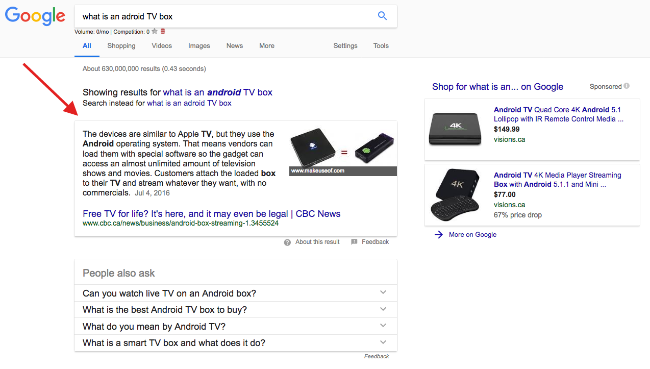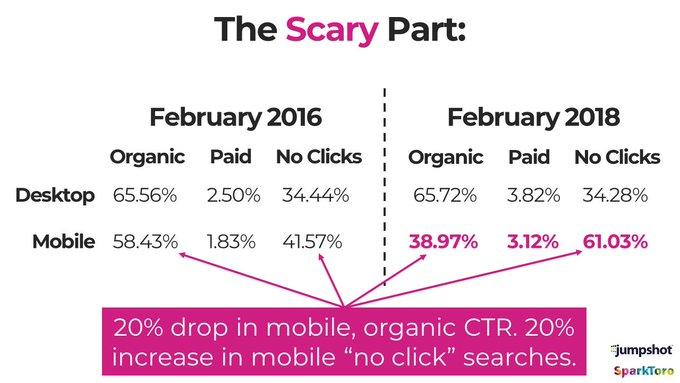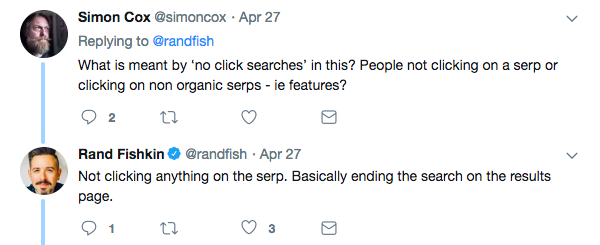In 2018 and beyond, digital marketers, and companies that embrace digital marketing strategies, need to be well versed in changing what they care about. Oh, and caring about a lot of things at once, which comes standard with living in the digital world. And for good measure, let’s throw in keeping on eye on the future with the intent to figure out the next pivot before anybody else – and boldly acting on it.
So when I see something like this, from one of the brightest and most influential SEO minds of the last decade, I think, “Hmm, maybe I need to dig into On-SERP SEO a little more.” A SERP, of course, is a search engine results page, and SEO is, well, you know by now!
This is why “On-SERP SEO” is, IMO, the most important trend in our field. A few years from now, we could see the vast majority of searches ending on Google’s results. Gotta learn how to influence searchers w/o earning the click.
Keep in mind this isn’t to say I started freaking out about On-SERP SEO, or that I wasn’t aware Google has been tinkering with SERPs (especially mobile SERPs) on the regular for a long time now. What it does mean is that since On-SERP SEO is on Rand’s mind, it should probably be on mine. It also means I’m interested in dedicating time specifically to generating On-SERP SEO results, which is something that may be on your radar, too.
What is On-SERP SEO
Before you can snag the answer box of your dreams, you first need to know what On-SERP SEO is (and if you don’t know, that’s totally fine).
On-SERP SEO is the optimization of any and all content on SERPs that you can either control or influence in some way. Traditionally, meta titles and meta descriptions were the main (and only!?) content that SEOs and content marketers could control on SERPs, but that changed when Google introduced featured snippets, which are:
Featured snippets are organic search results that Google doctors up to look pretty, and then places them in the most prominent position on the SERPs – yes, above the #1 results!
Here is the featured snippet on the SERP for the query, “What is an Android TV box?”:

If you’re looking for a quick primer on the different types of featured snippets and other On-SERP SEO content types, this is a great rundown.
Why is On-SERP SEO Important?
There are a number of reasons why On-SERP SEO is important. On a basic level, we can use the Android TV box example above to highlight why a business would covet the featured snippet the CBC currently has.
The CBC article explains what an Android TV box is, as well as how it allows users to “cut the cord” and essentially watch all the TV shows and movies they want – for free. It discusses the legality of the apps that allow users to stream for free, and even links out to some websites that sell preloaded TV boxes.
For a large media corporation like CBC, readership, traffic and awareness are the bread and butter of their business, so the more featured snippets they can attain, the better. In this specific case, they could likely earn some affiliate commissions with a featured snippet for a query with tens of thousands of searches per month, according to keyword data. For whatever it’s worth, CBC isn’t using affiliate links, but it’s easy to see why for content driven affiliate sites, featured snippets are extremely valuable.
There is another, less obvious reason On-SERP SEO is becoming a vital component of core SEO, and it’s summed up by this comment Rand made in the discussion thread of the tweet above:
If more and more searches are ending on the actual Google SERPs, as indicated by Rand’s original tweet and furthered by this comment, then On-SERP SEO is critical – especially because, at least right now, it’s difficult to discern what the goal of featured snippets should be, if not to generate click-throughs. As is usually the case in the digital world, the marketers and companies who figure out how to crack these tough questions are the big winners.
How to Optimize Your Content for SERPs
Ah, now to answer the question you’re all wondering about: how do you optimize your content in order to attain a featured snippet on Google’s search engine results page?
Here’s the short answer to how you win a featured snippet on Google’s search results pages:
1. Do keyword research to develop a shortlist of specific questions that a) you can answer and b) you can rank for
2. Rank on the first page for one of these search query questions
3. Optimize the content of your web page to very specifically answer the question
Simple, right? If only!
Look, nobody said this was going to be easy. The great Dr. Pete has been writing on this topic for years now, and his older articles are still some of the best content there is on the subject (here, here and here) – quite frankly because we just don’t have any more of an idea of what works. Of course, tools like Moz or SEMrush will make your life a lot easier if you’re planning on doing this alone, or you could always get in touch with us – we’d love to help you improve your On-SERP SEO!
At the end of the day, keeping up with On-SERP SEO trends, and perhaps attempting to win a featured snippet or two, likely puts you way ahead of your competition. And if you can become an expert at On-SERP SEO and make getting featured snippets like second nature, you’ll be reaping huge rewards in the future.



